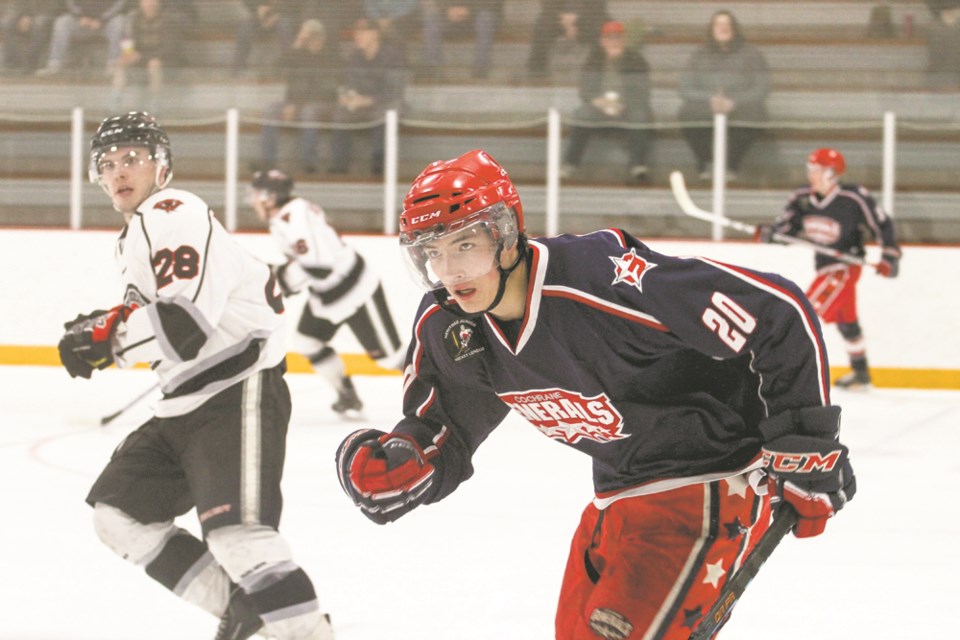For hockey teams like the Cochrane Generals, the cost of winning can be high – and they need to get creative in order to cover the soaring price of their success.
Along with the Gens’ Heritage Junior Hockey League south division win last weekend came an invite to the Hockey Alberta Junior B provincial championships in St. Paul at the end of March
There, the team will make a run for the Russ Barnes Trophy, along with seven more of the best squads in the province. If they win, the Gens will head to Winnipeg for the Keystone Cup – the pinnacle prize of Junior B hockey in western Canada – in April.
While the prospect is exciting for the organization, it’s also daunting, as the price tag to make it all possible could top $50,000.
“With all our expenses … we really need Cochrane to rally behind us,” said general manager Jacqueline Hurlbert.
Jesse Cheetham, general manager of the HJHL’s Blackfalds Wranglers, knows all too well the cost of winning: his team has won provincials three times and taken home the Keystone Cup once during his tenure.
“It’s such an arduous journey to even get there,” he said. “Then, generally, what you’re looking at – whether it’s provincials or westerns – is transportation, hotels, meals. $25K: it’s a good ballpark. When (the competition) is a couple of provinces over, you’re probably looking at around $50K.”
In 2014, after the Wranglers won provincial gold, Cheetham said team staff crunched the numbers and realized the best and most effective way to get to Abbotsford, British Columbia, for that year’s Keystone Cup was to charter a $30,000 private plane.
“It definitely saved us a lot of time,” he said, adding players, parents and equipment all fit on the aircraft, whereas a bus “(fits) just staff, the team and a couple of others. The parents were on the hook to get there themselves.”
The Okotoks Bisons won the Russ Barnes Trophy in 2013 and headed to St. Malo, Manitoba, for a run at that season’s Keystone Cup. Although they came home consolation champions, the success added a lot of zeroes to their bottom line, said Jay McFarlane, the team’s GM during that time.
“(Provincials) was a $25,000 expense to the club. This included bus, accommodations, meals…,” recalled McFarlane. “If you’re successful to win provincials and advance to the Keystone Cup, you can add another $25,000. Clubs that have had success on a consecutive basis will feel that in their budget each year.”
Cheetham said, partly because of the cost involved with pushing through to provincials and beyond, discussions about how far a team is willing and able to go in a season start long before the first puck drops.
“You have to make a conscious decision as an organization before you even start the year that you’re going to make the run. You need to know that you have somewhat of a shot,” he said.
Once the decision is made to strive for top prize, Cheetham said sponsorship is “absolutely critical.”
“Most teams have a pretty low cost of entry for players … around $200. You can’t even go play beer league for that,” he said. “After referees, music, whoever else you pay – you don’t make a ton. We had to get a little more creative in how we found sponsors.”
Symbiotic relationships work best to bring costs down for the team, said Cheetham, while also adding value for sponsors who are generous with their money at the same time.
Hurlbert said the Generals have great support from Cochrane’s Save-On Foods, which will help provide food if and when the team heads to Winnipeg for the 2017 Keystone Cup.
However, the biggest budget item the Gens will need help with is travel, since the only way to get everyone to Winnipeg efficiently is to travel the nearly 1,400 kilometres by plane.
“Logistically, the only option for us is to fly. Because of all our players being in school or working, you can’t just take a full week to bus out there and bus home,” she said. “It’s an additional $20,000 to $30,000 potentially.”
Hurlbert is hoping hockey fans here at home will find a way to financially assist the Generals – whose players give their heart and soul to the game – so they can do Cochrane proud and represent on the Canadian stage.
“It can go one of two ways: one person or one company that says, ‘I’ve got this, we’ve got this covered, we want Cochrane represented,’ or it takes a bunch of people,” she said.
“This (sponsorship) is giving back to the community and it’s helping local athletes. These kids have grown up here, they’re likely going to be getting into the workforce here, raising their families here … this is 100 per cent a community team. It would be a huge, huge, amazing thing.”




